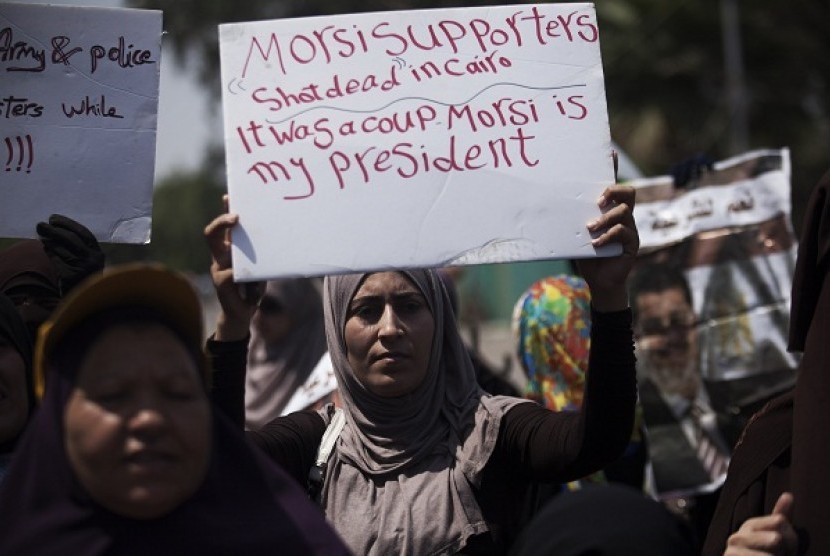REPUBLIKA.CO.ID, CAIRO - Egyptian soldiers and police clashed with people protesting the military's ouster of the president in bloodshed that left at least 51 protesters and three members of the security forces dead, officials and witnesses said, and plunged the divided country deeper into crisis with calls by the Muslim Brotherhood's political party for all-out rebellion against the army.
The carnage outside the Republican Guard building in Cairo — where toppled President Mohammed Mursi was first held last week — marked the single biggest death toll since massive protests forced Mursi's government from power and brought in an interim civilian administration.
Even before all the bodies were counted, there were conflicting accounts on how the violence began. The pro-Mursi protesters said the troops attacked their encampment without provocation just after they had performed dawn prayers. The military said it came under a heavy assault first by gunmen who killed an army officer and two policemen, though its account of the events left many questions unanswered.
Witnesses from outside the protest camp said troops appeared to be moving to clear the days-old sit-in and were firing tear gas, when gunfire erupted. One said she believed the fire came from the protesters' side, though others could not tell.
Whatever the spark, clashes went on for three hours, with protesters hurling stones and molotov cocktails from rooftops and gunshots ringing out. Nearby clinics run by Brotherhood supporters were swamped by wounded protesters, some with gaping, bleeding wounds. More than 400 were wounded in the mayhem, officials said.
The violence is almost certain to draw sharper battle lines between Mursi's Muslim Brotherhood, who say the military has carried out a coup against democracy, and their opponents, who claim Mursi squandered his 2012 election victory and was wrecking democracy by bolstering his and the Brotherhood's grip on the state.
Egypt's top Muslim cleric, who backed the removal of Mursi, warned of "civil war" and said he was going into seclusion until the violence ends — a rare and dramatic show of protest directed at both sides. He demanded a process immediately be set up for reconciliation, including the release of Brotherhood detainees.
Sheik Ahmed el-Tayeb, head of Al-Azhar Mosque, said he had "no choice" but to seclude himself at home "until everyone shoulders his responsibility to stop the bloodshed instead of dragging the country into civil war."
Soon after the attack, the Al-Nour party, an ultraconservative Islamist party that had been talking to the new government about participating in the political process, announced it was withdrawing its support for the transition plan in response to the "massacre."
The escalating chaos will also further complicate Egypt's relations with Washington and other Western allies, which had supported Mursi as the country's first freely elected leader and now are reassessing policies toward the military-backed group that forced him out.


